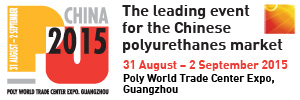PlastMilan: Italy’s show hatches new ideas
Also, download this story from the electronic issue here
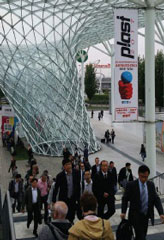
At the May-held Plast show in Milan, Italy, apart from the usual prospects, the exhibition highlighted a new business incubator initiative known as the Start Plast. Termed as a “seedbed for new projects”, the exhibition space was given free to some 30 start-up companies, run by young entrepreneurs, with a focus on 3D printing and biomaterial products, to regenerate the flagging Italian plastics manufacturing sector.
Revitalising the wine-in-pouch concept
One of the exhibitors included Italian/ Dutch design agency Reverse Innovation that has innovated a wine pouch. With current flexible packaging for wine having a mediocre image of the quality of the wine filled in it, Reverse Innovation Amsterdam (a spinoff of the Italian agency Reverse Innovation) wanted to overcome the negative image of wine sold in pouches or as a "bag in a box". It also set out to target the wine packaging segment that is traditional and not open to changes.
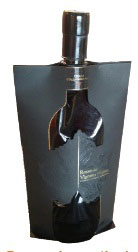
The design was born from a partnership with wine maker Gigante and Dutch packaging firm Dackla Pack. The result is a graphic and structural pack that reinterprets the classic Bordeaux bottle. "The contours of the bottle shape are emphasised with gold foil while the terroir of the wine is retold through the use of blind embossing and UV varnish to reproduce the specific shape of the vine leaf which is characteristic of the area," said Mirco Onesti, Reverse Innovation's Creative Director/Partner. "Our intention was to create a high quality product, in order to offer an unconventional and alternative pack for the wine sector.”
Wine bottles are intended to be touched and handled so consideration of the aesthetic, tactile and functional experience was essential. Thus, a simple black pouch is wrapped in a paper sleeve that defines the shape of the product.
The patented plastic pouch is made of METPET (metallised films coated with aluminium) and BOPP. It has already been in the market for a year, according to Onesti. "We are 95% ready to launch it."
Onesti said the company was speaking to some Australian wine makers and also olive oil producers. "The benefits are easier handling since the packaging is light and easier to ship as well as produce since a standard filling machine can be used." When asked about the life span of the wine filled in the pouch, Onesti said it would be two years.
"Basically, our intention is to target higher quality wines that range up to EUR15 currently and make them more marketable as well as the transition of bottled products to flexible pouch solutions in other sectors." Already, the wine pouch has won five international design prizes.
Orthopaedic therapy made easier
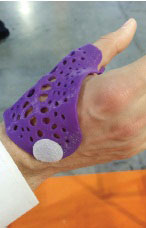
Launched a year ago, Siena-located Proteo has been busy promoting its solution for producing customised orthopedic braces, for the hand and wrist, through digital fabrication.
According to co-founder Federico Papi, "We offer custom solutions (platform win/iOS, instruments) with b-2-b software and hardware solutions for orthopaedic devices that involve 3D scanning and printing.” He explained that the customised hardware helps a technician to realise better scanning, adding that the technician is usually not an expert in operating CAD modelling and thus, Proteo has made it easy with its solutions. “A technician can easily define the geometry of a medical device then send it to a printer.” The solution consists of a scanner and a software programme. The company is also working with collaborators to develop the 3D printer.
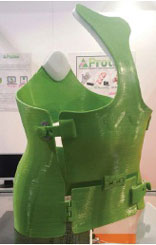
A technician can either scan and input all the data and later print the device, or allow Proteo, via a dedicated Internet server, to produce the printable template of the device using SLS technology (nylon) or fused deposition technology (PLA). The whole process takes less than a minute unlike CAD that will take up to an hour, according to Papi.
“We are speaking to all private and public health and orthopaedic centres that want to take the business advantages from a digital process of production. Digital fabrication is the future and we are looking at collaborating with medical professionals.” Currently, it has tied up with a public hospital in Florence to study the feasibility of the hand/wrist orthopaedic therapy devices.
Biomaterials from waste
Another company EggPlant (not to be confused with the vegetable!) that was incubated in 2013 has innovated a technology for producing PHB (Polyhydroxybutyrate) bioplastics using wastewater from the agrifood industry, currently obtained from the production of olive oil. “The bacteria eat the nutrients in the water and produce the PHB, which we harvest. In this way, we address two big problems: wastewater disposal and pollution caused by the manufacture and use of traditional hydrocarbonsbased plastics,” said co-founder of the firm, Domenic Centrone.
Having filed two patents for the technology, the company is now ready for the pilot stage of the PHB. The pilot plant will be located at the Parco Tecnologico Padano, the engine of Lodi Cluster, a Science Park that promotes innovation within the agro-food and biotech sectors.
Besides that, the company has also developed proprietary smart technology platforms based on its bioplastic, such as a soft bio-compound, conductive bioplastic for high-tech electronic devices, active packaging and medical devices.
Integrated recycling/3D printing
Also concerned with the waste produced is management consultancy Alot. It is convinced that digital manufacturing can be once again crucial to mark a revolution in the recycling of waste. According to a partner in the firm, Matteo Brambilla, “The present business proposal has as a basic idea to use post-consumer plastics as raw material in an integrated recycling-digital manufacturing system.” The biomaterials targeted are from PET bottles.
Brambilla said the company is planning to launch its integrated recycling/3D printing machine on a wider scale, and to egg on local authorities to adopt bottle-to-bottle recycling to produce rPET for producing small items from the 3D printer, like furniture.
“We have already done a prototype and are now doing the testing in Calabria and are planning to undertake a second test in a bigger city like Lombardia in Northern Italy.” Alot has spun-off the EDM (Eco digital manufacturing) laboratory to undertake the testing of the machine.
But Brambilla does agree that PET material is not the best for 3D printing, unlike PLA and nylon, adding that the company is building a special cover to contain the smell and chemicals released when undertaking 3D printing using rPET.
“This integrated recycling-digital manufacturing solution will enable disposal and recycling at the level of urban communities and small family groups, saving costs and the environmental impact of transport of waste and avoiding the need for large temporary storage of waste with associated costs for maintenance and CO2 emissions,” he said.
Baby products from bioplastics
With the stringent rules in Europe on the use of lead paint and flexible plastics containing plasticisers for baby products, companies are resorting to the use of bioplastics.
Ekoala (a typical Italian firm and nothing to do with koalas from Australia!) had displayed a range of baby and children’s products made from Italian chemical firm Novamont’s MaterBi bioplastics.
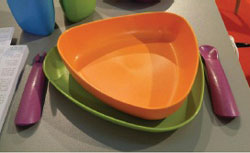
According to the firm’s co-founder Daniele Radaelli, “We believe it is high time to start building a world for our children that truly is a Wonderland. Made in Italy has always been linked to the idea of high quality, beauty, creativity and passion and hence our designs.”
Though the company, that was established in November last year, has not started producing the products yet with the displayed items being the first showcase, the target of Ekoala is a range of children’s toys, cups, plates in attractive, bright colours.
Besides the bioplastics used, Radaelli said that the pigments used are also biobased, from Swiss firm Clariant's compostable Renol line. Plus, Ekoala is working on obtaining food contact certification, with Radaelli stating that once all the certifications are in place the company will launch its products, with a target of hitting retail stores at the end of the year.
(PRA)Copyright (c) 2015 www.plasticsandrubberasia.com. All rights reserved.












